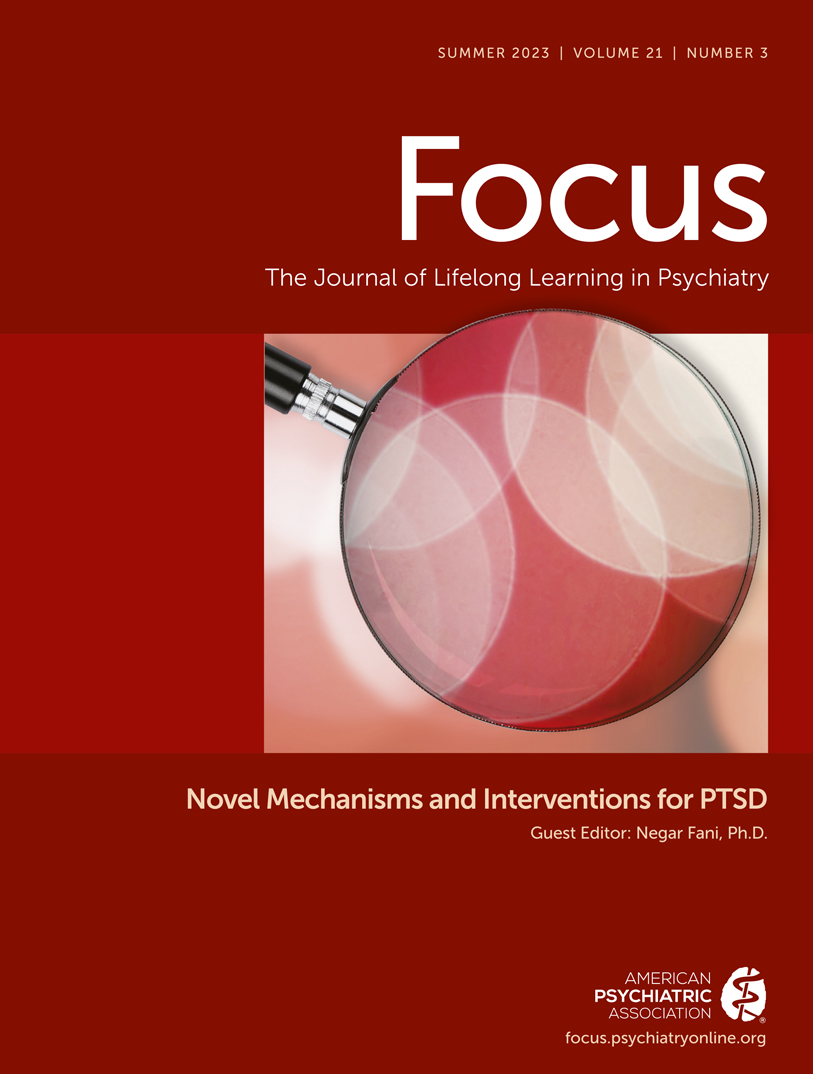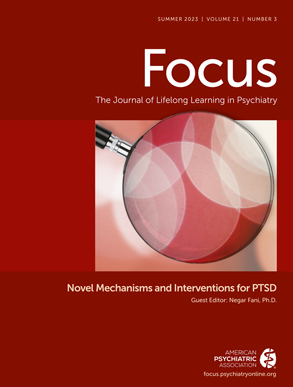Given space limitations and varying reprint permission policies, not all of the influential publications the editors considered reprinting in this issue could be included. This section contains abstracts from additional articles the editors deemed well worth reviewing.
Dose-Related Effects of Ketamine for Antidepressant-Resistant Symptoms of Posttraumatic Stress Disorder in Veterans and Active Duty Military: A Double-Blind, Randomized, Placebo-Controlled Multi-Center Clinical Trial
Abdallah CG, Roache JD, Gueorguieva R, et al.
Neuropsychopharmacology 2022; 47:1574–1581
This study tested the efficacy of repeated intravenous ketamine doses to reduce symptoms of posttraumatic stress disorder (PTSD). Veterans and service members with PTSD (n=158) who failed previous antidepressant treatment were randomized to 8 infusions administered twice weekly of intravenous placebo (n=54), low dose (0.2 mg/kg; n=53) or standard dose (0.5 mg/kg; n=51) ketamine. Participants were assessed at baseline, during treatment, and for 4 weeks after their last infusion. Primary analyses used mixed effects models. The primary outcome measure was the self-report PTSD Checklist for
DSM-5 (PCL-5), and secondary outcome measures were the Clinician-Administered PTSD Scale for
DSM-5 (CAPS-5) and the Montgomery Åsberg Depression Rating Scale (MADRS). There were no significant group-by-time interactions for PTSD symptoms measured by the PCL-5 or CAPS-5. The standard ketamine dose ameliorated depression measured by the MADRS significantly more than placebo. Ketamine produced dose-related dissociative and psychotomimetic effects, which returned to baseline within 2 h and were less pronounced with repeated administration. There was no evidence of differential treatment discontinuation by ketamine dose, consistent with good tolerability. This clinical trial failed to find a significant dose-related effect of ketamine on PTSD symptoms. Secondary analyses suggested that the standard dose exerted rapid antidepressant effects. Further studies are needed to determine the role of ketamine in PTSD treatment.
ClinicalTrials.gov identifier: NCT02655692.
Copyright 2022 Springer Nature. Reprinted with permission.
Interoceptive Cardiac Signals Selectively Enhance Fear Memories
Garfinkel SN, Gould van Praag CD, Engels M, et al.
J Exp Psychol Gen 2021; 150:1165–1176
Fear is coupled to states of physiological arousal. We tested how learning and memory of threat, specifically conditioned fear, is influenced by interoceptive signals. Forty healthy individuals were exposed to two threat (conditioned stimuli [CS+], paired with electrocutaneous shocks) and two safety (CS-) stimuli, time-locked to either cardiac ventricular systole (when arterial baroreceptors signal cardiovascular arousal to brainstem), or diastole (when these afferent signals are quiescent). Threat learning was indexed objectively using skin conductance responses (SCRs). During acquisition of threat contingencies, cardiac effects dominated: Stimuli (both CS+ and CS-) presented at systole evoked greater SCR responses, relative to stimuli (both CS+ and CS-) presented at diastole. This difference was amplified in more anxious individuals. Learning of conditioned fear was established by the end of the acquisition phase, which was followed by an extinction phase when unpaired CSs were presented at either the same or switched cardiac contingencies. One day later, electrocutaneous shocks triggered the reinstatement of fear responses. Subsequent presentation of stimuli previously encoded at systole evoked higher SCRs. Moreover, only those participants for whom stimuli had the same cardiac-contingency over both acquisition and extinction phases retained conditioned fear memory (i.e., CS+ > CS-).Our findings reveal two important cardiac afferent effects on threat learning and memory: 1) Cardiac signals bias processing toward threat; and 2) cardiac signals are a context for fear memory; altering this context can disrupt the memory. These observations suggest how threat reactivity may be reinforced and maintained by both acute and enduring states of cardiac arousal.
Copyright 2021 American Psychological Association. Reprinted with permission.
Deconstructing the Gestalt: Mechanisms of Fear, Threat, and Trauma Memory Encoding
Maddox SA, Hartmann J, Ross RA, et al.
Neuron 2019; 102:60–74
Threat processing is central to understanding debilitating fear- and trauma-related disorders such as posttraumatic stress disorder (PTSD). Progress has been made in understanding the neural circuits underlying the “engram” of threat or fear memory formation that complements a decades-old appreciation of the neurobiology of fear and threat involving hub structures such as the amygdala. In this review, we examine key recent findings, as well as integrate the importance of hormonal and physiological approaches, to provide a broader perspective of how bodily systems engaged in threat responses may interact with amygdala-based circuits in the encoding and updating of threat-related memory. Understanding how trauma-related memories are encoded and updated throughout the brain and the body will ultimately lead to novel biologically-driven approaches for treatment and prevention.
Copyright 2019 Elsevier. Reprinted with permission.

